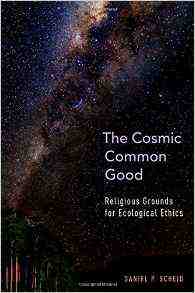By Daniel P. Scheid
Oxford, U.K.: Oxford University Press, 2016
As ecological degradation continues to threaten permanent and dramatic changes for life on our planet, the question of how we can protect our imperiled Earth has become more pressing than ever before. In this book, Daniel Scheid draws on Catholic social thought to construct what he calls the “cosmic common good,” a new norm for interreligious ecological ethics. This ethical vision sees humans as an intimate part of the greater whole of the cosmos, emphasizes the simultaneous instrumental and intrinsic value of nature, and affirms the integral connection between religious practice and the pursuit of the common good. When ecologically reoriented, Catholic social thought can point the way toward several principles of the cosmic common good, such as the virtue of Earth solidarity and the promotion of Earth rights. These are rooted in the classical doctrines of creation in Augustine and Thomas Aquinas, and in Thomas Berry’s interpretation of the evolutionary cosmic story. The cosmic common good can also be found in Hindu, Buddhist, and American Indian religious traditions. By placing a Catholic cosmic common good in dialogue with Hindu dharmic ecology, Buddhist interdependence, and American Indian balance with all our relations, Scheid constructs a theologically authentic moral framework that re-envisions humanity’s role in the universe.
